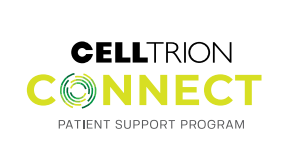Patients treated with YUFLYMA® are at increased risk for developing serious infections that may lead to hospitalization or death. Most patients who developed these infections were taking concomitant immunosuppressants such as methotrexate or corticosteroids.
Discontinue YUFLYMA® if a patient develops a serious infection or sepsis.
Reported infections include:
Active tuberculosis (TB), including reactivation of latent TB. Patients with TB have frequently presented with disseminated or extrapulmonary disease. Test patients for latent TB before YUFLYMA® use and during therapy. Initiate treatment for latent TB prior to YUFLYMA® use.
Invasive fungal infections, including histoplasmosis, coccidioidomycosis, candidiasis, aspergillosis, blastomycosis, and pneumocystosis. Patients with histoplasmosis or other invasive fungal infections may present with disseminated, rather than localized, disease. Antigen and antibody testing for histoplasmosis may be negative in some patients with active infection. Consider empiric antifungal therapy in patients at risk for invasive fungal infections who develop severe systemic illness.
Bacterial, viral, and other infections due to opportunistic pathogens, including Legionella and Listeria.
Carefully consider the risks and benefits of treatment with YUFLYMA® prior to initiating therapy in patients with chronic or recurrent infection.
Monitor patients closely for the development of signs and symptoms of infection during and after treatment with YUFLYMA®, including the possible development of TB in patients who tested negative for latent TB infection prior to initiating therapy.
Treatment with YUFLYMA® should not be initiated in patients with an active infection, including localized infections. Patients over 65 years of age, patients with co-morbid conditions and/or patients taking concomitant immunosuppressants (such as corticosteroids or methotrexate), may be at greater risk of infection. Discontinue YUFLYMA® if a patient develops a serious infection or sepsis. For a patient who develops a new infection during treatment with YUFLYMA®, closely monitor them, perform a prompt and complete diagnostic workup appropriate for an immunocompromised patient, and initiate appropriate antimicrobial therapy. Drug interactions with biologic products: In clinical studies in patients with RA, an increased risk of serious infections has been observed with the combination of TNF blockers with anakinra or abatacept, with no added benefit; therefore, use of YUFLYMA® with abatacept or anakinra is not recommended in patients with RA. A higher rate of serious infections has also been observed in patients with RA treated with rituximab who received subsequent treatment with a TNF blocker. There is insufficient information regarding the concomitant use of YUFLYMA® and other biologic products for the treatment of RA, PsA, AS, CD, UC, PS, and HS. Concomitant administration of YUFLYMA® with other biologic DMARDS (e.g., anakinra and abatacept) or other TNF blockers is not recommended based upon the possible increased risk for infections and other potential pharmacological interactions. A higher rate of serious infections has been observed in RA patients treated with rituximab who received subsequent treatment with a TNF blocker.
MALIGNANCY
Lymphoma and other malignancies, some fatal, have been reported in children and adolescent patients treated with TNF blockers, including adalimumab products. Postmarketing cases of hepatosplenic T-cell lymphoma (HSTCL), a rare type of T-cell lymphoma, have been reported in patients treated with TNF blockers, including adalimumab products. These cases have had a very aggressive disease course and have been fatal. The majority of reported TNF blocker cases have occurred in patients with Crohn’s disease or ulcerative colitis and the majority were in adolescent and young adult males. Almost all of these patients had received treatment with azathioprine or 6-mercaptopurine concomitantly with a TNF blocker at or prior to diagnosis. It is uncertain whether the occurrence of HSTCL is related to use of a TNF blocker or a TNF blocker in combination with these other immunosuppressants.
Consider the risks and benefits of TNF blocker treatment including YUFLYMA® prior to initiating therapy in patients with a known malignancy other than a successfully treated non-melanoma skin cancer (NMSC), or when considering continuing a TNF blocker in patients who develop a malignancy.
In controlled portions of clinical trials of some adalimumab products, more cases of malignancies have been observed compared to control-treated adult patients.
Non-melanoma skin cancer (NMSC) was reported during clinical trials for patients treated with adalimumab products. During the controlled portions of 39 global adalimumab clinical trials in adult patients with RA, PsA, AS, CD, UC, Ps, HS, and another indication, the rate (95% confidence interval) of NMSC was 0.8 (0.52, 1.09) per 100 patient-years among adalimumab-treated patients and 0.2 (0.10, 0.59) per 100 patient-years among control-treated patients. Examine all patients, and in particular patients with a medical history of prior prolonged immunosuppressant therapy or psoriasis patients with a history of PUVA treatment for the presence of NMSC prior to and during treatment with Adalimumab.
In clinical trials of some adalimumab products, there was an approximate threefold higher rate of lymphoma than expected in the general U.S. population. Patients with RA and other chronic inflammatory diseases, particularly those with highly active disease and/or chronic exposure to immunosuppressant therapies, may be at a higher risk (up to several fold) than the general population for the development of lymphoma, even in the absence of TNF blockers.
Postmarketing cases of acute and chronic leukemia were reported with use of a TNF blocker in RA and other indications. Approximately half of the postmarketing cases of malignancies in children, adolescents, and young adults receiving adalimumab were lymphomas; other cases represented a variety of different malignancies and included rare malignancies usually associated with immunosuppression and malignancies that are not usually observed in children and adolescents.
HYPERSENSITIVITY
Anaphylaxis and angioneurotic edema have been reported following administration of adalimumab products. If an anaphylactic or other serious allergic reaction occurs, immediately discontinue administration of YUFLYMA® and institute appropriate therapy.
HEPATITIS B VIRUS REACTIVATION
Use of TNF blockers, including YUFLYMA®, may increase the risk of reactivation of hepatitis B virus (HBV) in patients who are chronic carriers. In some instances, HBV reactivation occurring in conjunction with TNF blocker therapy has been fatal. Evaluate patients at risk for HBV infection for prior evidence of HBV infection before initiating TNF blocker therapy. Exercise caution in prescribing TNF blockers for patients identified as carriers of HBV and closely monitor such patients for clinical and laboratory signs of active HBV infection throughout therapy and for several months following termination of therapy. In patients who develop HBV reactivation, stop YUFLYMA® and initiate effective antiviral therapy with appropriate supportive treatment. The safety of resuming TNF blocker therapy after HBV reactivation is controlled is not known. Therefore, exercise caution when considering resumption of YUFLYMA® therapy in this situation and monitor patients closely.
NEUROLOGIC REACTIONS
Use of TNF blocking agents, including adalimumab products, has been associated with rare cases of new onset or exacerbation of clinical symptoms and/or radiographic evidence of central nervous system demyelinating disease, including multiple sclerosis (MS) and optic neuritis, and peripheral demyelinating disease, including Guillain-Barré syndrome. Exercise caution in considering the use of YUFLYMA® in patients with preexisting or recent-onset central or peripheral nervous system demyelinating disorders; discontinuation of YUFLYMA® should be considered if any of these disorders develop. There is a known association between intermediate uveitis and central demyelinating disorders.
HEMATOLOGIC REACTIONS
Rare reports of pancytopenia including aplastic anemia have been reported with TNF blocking agents. Adverse reactions of the hematologic system, including medically significant cytopenia, have been infrequently reported with adalimumab products. Consider discontinuation of YUFLYMA® therapy in patients with confirmed significant hematologic abnormalities.
HEART FAILURE
Cases of worsening congestive heart failure (CHF) and new-onset CHF have been reported with TNF blockers. Cases of worsening CHF have also been observed with adalimumab products. Exercise caution when using YUFLYMA® in patients who have heart failure and monitor them carefully.
AUTOIMMUNITY
Treatment with adalimumab products may result in the formation of autoantibodies and, rarely, in the development of a lupus-like syndrome. If a patient develops symptoms suggestive of a lupus-like syndrome following treatment with YUFLYMA®, discontinue treatment.
IMMUNIZATIONS
Patients on YUFLYMA® may receive concurrent vaccinations, except for live vaccines. It is recommended that pediatric patients, if possible, be brought up to date with all immunizations in agreement with current immunization guidelines prior to initiating YUFLYMA® therapy. No data are available on the secondary transmission of infection by live vaccines in patients receiving adalimumab products. The safety of administering live or live-attenuated vaccines in infants exposed to adalimumab in utero is unknown. Risks and benefits should be considered prior to vaccinating (live or live-attenuated) exposed infants.
ADVERSE REACTIONS
The most common adverse reactions in adalimumab clinical trials (>10%) were: infections (e.g., upper respiratory, sinusitis), injection site reactions, headache, and rash.
YUFLYMA® is a tumor necrosis factor (TNF) blocker indicated for:
Rheumatoid Arthritis (RA) : reducing signs and symptoms, inducing major clinical response, inhibiting the progression of structural damage, and improving physical function in adult patients with moderately to severely active RA
Juvenile Idiopathic Arthritis (JIA) : reducing signs and symptoms of moderately to severely active polyarticular JIA in patients 2 years of age and older.
Psoriatic Arthritis (PsA) : reducing signs and symptoms, inhibiting the progression of structural damage, and improving physical function in adult patients with active PsA.
Ankylosing Spondylitis (AS) : reducing signs and symptoms in adult patients with active AS.
Crohn’s Disease (CD) : treatment of moderately to severely active Crohn’s disease in adults and pediatric patients 6 years of age and older.
Ulcerative Colitis (UC) : treatment of moderately to severely active ulcerative colitis in adults.
Limitations of Use : Effectiveness has not been established in patients who have lost response to or were intolerant to TNF blockers.
Plaque Psoriasis (Ps) : treatment of adult patients with moderate to severe chronic plaque psoriasis who are candidates for systemic therapy or phototherapy, and when other systemic therapies are medically less appropriate.
Hidradenitis Suppurativa (HS) : treatment of adult patients with moderate to severe hidradenitis suppurativa.
Uveitis (UV) : treatment of non-infectious intermediate, posterior, and panuveitis in adult patients.





